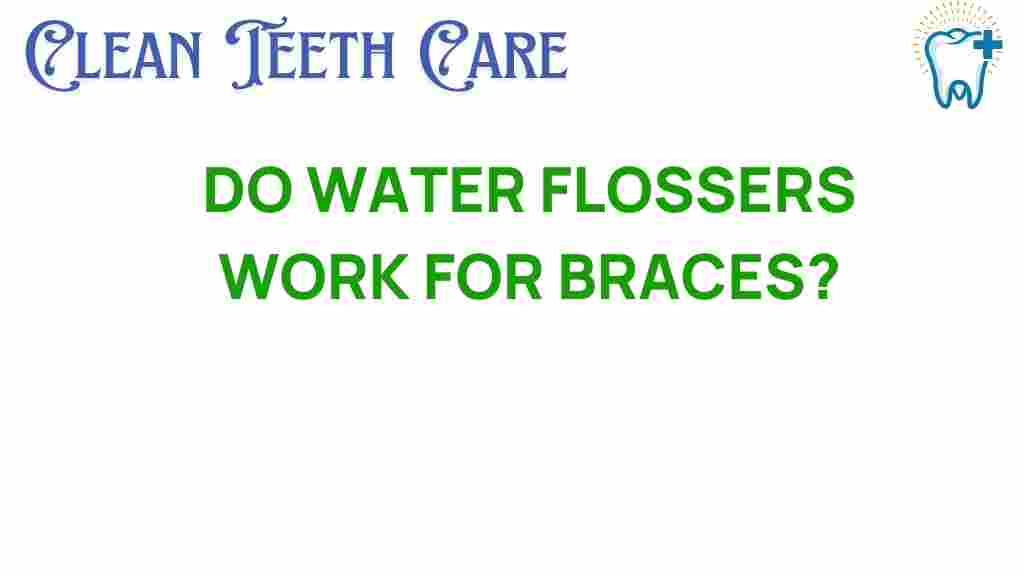Do Water Flossers Really Work for Braces? Discover the Truth!
Maintaining excellent oral hygiene is crucial for everyone, especially for those undergoing orthodontic treatment with braces. As more people turn to water flossers as a cleaning tool, one common question arises: do water flossers really work for braces? In this article, we will explore the effectiveness, benefits, and overall patient experience of using water flossers in conjunction with braces.
Understanding the Importance of Oral Hygiene with Braces
Braces are essential for correcting misaligned teeth and improving overall dental health. However, they can make traditional cleaning methods more challenging. The brackets and wires can trap food particles and plaque, making it easier for cavities and gum disease to develop. Hence, maintaining proper oral hygiene is vital. Regular brushing and flossing are necessary, but many patients wonder if water flossers can enhance their dental care routine.
What Are Water Flossers?
Water flossers, also known as oral irrigators, are devices that use a stream of pulsating water to remove food debris and plaque from between teeth and along the gum line. Unlike traditional floss, water flossers can be easier to use, especially for those with braces. Here’s how they work:
- Pulsating Water: Water flossers deliver a targeted stream of water that can reach areas traditional flossing may miss.
- Adjustable Pressure Settings: Many models allow users to adjust the water pressure, catering to sensitive gums.
- Various Tips: Most water flossers come with different tips designed for specific needs, including orthodontic tips for braces.
Effectiveness of Water Flossers for Braces
Research indicates that water flossers can be effective tools for maintaining oral hygiene among brace-wearers. Here are some reasons why:
- Improved Plaque Removal: Studies have shown that water flossers can remove more plaque than traditional floss, especially around braces.
- Reduction in Gum Disease: Regular use can help reduce gingivitis, a common issue for those with braces.
- Ease of Use: Many patients find water flossers easier and more comfortable to use than traditional flossing methods.
Benefits of Using Water Flossers with Braces
Incorporating water flossers into your dental care routine provides several benefits:
- Time-Saving: Water flossing can be quicker than conventional flossing, making it easier for busy individuals to maintain oral hygiene.
- Comfort: The gentle stream of water is less abrasive than traditional floss, making it ideal for sensitive gums.
- Accessibility: For patients with limited dexterity, water flossers can be a more accessible option compared to traditional flossing.
- Enhanced Cleaning: Water flossers can reach areas that a toothbrush or traditional floss might miss, especially around brackets and wires.
How to Use a Water Flosser with Braces: Step-by-Step Process
Using a water flosser is simple, but doing it correctly ensures maximum effectiveness. Follow these steps:
- Prepare the Flosser: Fill the reservoir with warm water and select the appropriate tip, preferably an orthodontic tip.
- Adjust the Pressure: Start with a lower pressure setting, especially if you are new to using a water flosser.
- Lean Over the Sink: Position yourself over the sink to catch any excess water during the process.
- Begin Flossing: Place the tip in your mouth, turn on the device, and direct the water stream along the gum line and between the teeth, focusing on the areas around the braces.
- Continue for 1-2 Minutes: Spend enough time to thoroughly clean all areas. You can pause to spit if needed.
- Rinse Your Mouth: After using the flosser, rinse your mouth with water or mouthwash for added freshness.
Patient Experience: Real-Life Feedback
Many patients with braces have shared their experiences using water flossers. Here’s what they have to say:
- Convenience: Many users appreciate the convenience of water flossers, noting that they fit easily into their daily routine.
- Improved Comfort: Patients often report less discomfort compared to traditional flossing, especially during the initial months of wearing braces.
- Positive Results: Numerous users have experienced fewer visits to the dentist for dental cleanings and have noted improvements in their gum health.
Troubleshooting Tips for Using Water Flossers
While water flossers are generally easy to use, you may encounter some challenges. Here are some troubleshooting tips:
- Too Much Pressure: If the water pressure feels uncomfortable, lower the setting until you find a comfortable level.
- Water Leakage: Ensure the reservoir is securely attached and that the tip is properly inserted.
- Food Particles Still Present: Focus on angling the water stream correctly and spend sufficient time in each area.
Combining Water Flossers with Other Oral Hygiene Practices
While water flossers provide excellent benefits, they should not replace traditional oral hygiene methods. For optimal results, consider the following:
- Brush Twice Daily: Use a soft-bristled toothbrush and fluoride toothpaste to brush your teeth at least twice a day.
- Use Traditional Floss: While water flossers are effective, using traditional floss can help remove debris in tighter spaces.
- Regular Dental Visits: Ensure you visit your orthodontist regularly for check-ups and adjustments to your braces.
For more information on maintaining oral hygiene with braces, check out this dental care guide.
Conclusion
Water flossers can be an effective and beneficial addition to your oral hygiene routine while wearing braces. They offer numerous advantages, including improved plaque removal, ease of use, and enhanced comfort compared to traditional flossing. While they should complement traditional methods like brushing and flossing, many patients report a positive experience, leading to better overall oral health.
In summary, if you’re looking for a way to enhance your dental care with braces, consider incorporating a water flosser into your daily routine. The effectiveness and benefits make it a worthwhile investment for anyone committed to maintaining excellent oral hygiene during their orthodontic treatment.
For further reading on the importance of oral hygiene, check out this informative article.
This article is in the category Hygiene and created by CleanTeethCare Team
